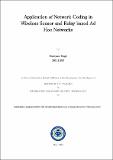Please use this identifier to cite or link to this item:
http://drsr.daiict.ac.in//handle/123456789/558| Title: | Application of network coding in wireless sensor and relay based ad hoc networks |
| Authors: | Pillutla, Laxminarayana S. Singh, Dushyant |
| Keywords: | Ad-hoc networks Wireless communication systems Sensor networks |
| Issue Date: | 2015 |
| Publisher: | Dhirubhai Ambani Institute of Information and Communication Technology |
| Citation: | Singh, Dushyant (2015). Application of network coding in wireless sensor and relay based ad hoc networks. Dhirubhai Ambani Institute of Information and Communication Technology, vi, 40 p. (Acc.No: T00521) |
| Abstract: | Network Coding (NC) is a new area which brings radical change in the way we treat information flow in networks. NC considered being a layer 3 operation has been shown to improve the throughput of wired networks especially for broadcast and multicast traffic. Linear network coding (LNC) in which packets are combined using simple linear operations over finite fields can indeed achieve the multicast capacity. Random LNC (RLNC) is attractively used for distributed scenario where the codes are generated by various nodes in random fashion. The data dissemination latency scales as O(N2) (N is the number of nodes) in naive broadcast scenario. However with RLNC the data dissemination latency scales between O(N) and O(N2) depending on the network connectivity. NC is at the heart of two problems that we have considered in this thesis. Firstly we consider collaborative distributed indoor target tracking using wireless sensor networks (WSNs) where we show how RLNC can be used for effective information dissemination and analyzed its impact on tracking performance for the case of indoor target tracking. Our simulation results demonstrate that for a target root mean square (RMS) value of tracking error the RLNC scheme would require less number of time slots in comparison with the two competing schemes. Secondly we consider the performance of NC in relay assisted contention based ad hoc networks considered like the IEEE 802.11 compliant ones. We specifically show as how MAC layer NC can be used at both relay, source & destination nodes to improve throughput in contention based wireless networks. Our simulation results demonstrate an increment in system throughput by 15-20% for the case with NC. |
| URI: | http://drsr.daiict.ac.in/handle/123456789/558 |
| Appears in Collections: | M Tech Dissertations |
Files in This Item:
| File | Description | Size | Format | |
|---|---|---|---|---|
| 201311027.pdf Restricted Access | 811.93 kB | Adobe PDF |  View/Open Request a copy |
Items in DSpace are protected by copyright, with all rights reserved, unless otherwise indicated.
